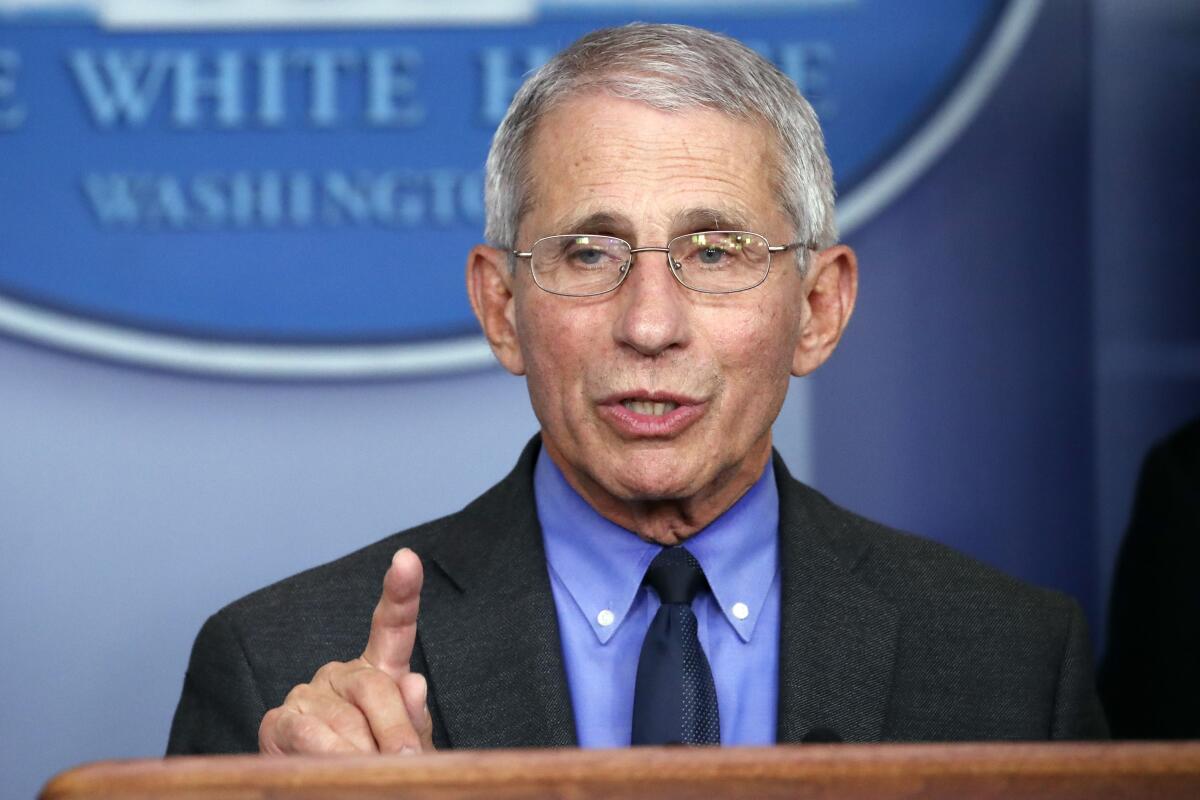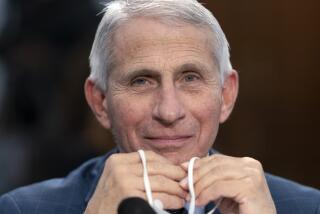Coronavirus could worsen in winter, remain major threat through 2021, Fauci says

- Share via
The COVID-19 pandemic could worsen in the winter and continue to be a looming threat through much of 2021.
That is the forecast of Dr. Anthony Fauci, the federal government’s top infectious diseases expert, in a wide-ranging discussion about the pandemic that he delivered this week to the Berkeley Forum.
Fauci warned that a sense of normality post-coronavirus may not come to the U.S. until late 2021, adding that the arrival of a vaccine will not suddenly bring the U.S. lurching back. Rather, it’ll be a gradual transition over a long period of time.
Fauci offered analysis at the Thursday forum about where we stand on the pandemic — from the importance of masks to the mistakes made by colleges, the dangers of internet disinformation and the grim toll COVID-19 is taking on nonwhite communities.
Masks may be part of a return to normal for some time
The U.S. faces two problems: The vaccine won’t be 99% effective, and a substantial proportion of Americans have indicated they will not take the inoculation.
“So let’s say you have a 75% effective vaccine, and 65% to 80% of the people want to get vaccinated: You still have a lot of people in society … that are vulnerable to be infected,” Fauci said. That means “we’re going to softly go into a graded degree of normality.”
In this new normal, more types of businesses will be able to reopen. But some pandemic protections may still be needed for a longer period than others.
“Will people have to wear masks? Yes, likely,” Fauci said. “I would imagine that if we get a good vaccine now, that we could have some degree of normality in the third quarter to the fourth quarter of 2021.
“I think ultimately, we will get back to normality as we knew it before this. But … it’s going to be a gradual process, in which the restrictions on things — restaurant numbers, theater attendance, spectators at sports [events] — all of that will come back gradually. But it will come back.”
We could be in for a tough winter
At the moment, the U.S. is still diagnosing about 40,000 new infections of the coronavirus daily — “which is unacceptably high,” Fauci said, as the nation moves into the cooler seasons.
“We’ve got to get that down or otherwise, we’re going to have a very tough winter in the next few months,” Fauci said.
According to the Los Angeles Times’ coronavirus tracker, California has averaged about 3,300 new coronavirus cases a day for the last week — a number that’s still higher than during the initial springtime wave of cases that prompted the state’s first stay-at-home order.
Los Angeles County on Wednesday reported its highest daily count of coronavirus infections since Aug. 22, highlighting the continued dangers of the virus even as more businesses are opening up. The uptick in cases in Los Angeles and several other California counties is cause for concern, but experts state that it’s too early to say whether it represents the start of a larger surge in infections.
Immunity might last for only several months
Unlike with measles, which typically confers lifelong immunity after infection or a vaccination, scientists don’t expect that a coronavirus infection or inoculation will confer immunity that will last for decades.
There are now about eight or nine cases of re-infection that have been reported, Fauci said. “The protection doesn’t last decades and decades. It lasts more [like] many months to a year or two.”
That means even after a vaccine becomes available, a booster shot may be required to keep people protected, similar to how people need booster shots to protect against tetanus.
Conspiracy theories, fueled by social media, hurt public health
Fauci lamented the role of social media in disseminating false statements about the pandemic.
“Social media … is an extraordinary way to disseminate information quickly and widely,” Fauci said. But, he added, “when disinformation gets in there, it has a way of self-propagating itself to the point where you don’t know what’s true.”
Some of the dangerous falsehoods include the idea that the pandemic is trivial, even though it is in fact the worst pandemic in more than a century.
More than 212,000 people in the U.S. have died from COVID-19, a number nearly equal to the number of deaths from the last six flu seasons.
“How can it be a trivial outbreak if it’s already killed 210,000 people in the United States and a million people worldwide?” Fauci asked. “But there are people out there that think all of this is a big conspiracy.”
Mask recommendations changed because the science changed
President Trump has publicly cast doubt on the importance of using masks. And in a presidential debate with Joe Biden, Trump noted Fauci’s shifting comments on whether to wear masks, saying, “He said very strongly, ‘Masks are not good.’ Then he changed his mind. He said, ‘Masks are good.’”
Fauci has said in an earlier interview with ABC News that Trump was taking his comments out of context.
At the Berkeley Forum, Fauci explained that federal officials’ initial comments in February that the public need not wear masks was based on the circumstances at that time: a nationwide shortage of masks and a fear that recommending mask use for the public would worsen the supply of masks for the nation’s first responders, nurses, doctors and other essential workers.
“They were also not recommended because there was not yet enough data to indicate that masks were actually quite effective in preventing the acquisition and transmission of infection,” Fauci said.
Then it became clear that for the public, cloth masks “were just as good as the surgical mask” in interrupting transmission and acquisition of the coronavirus, Fauci said.
It also became clear that about 40% to 50% of all infected people have no symptoms at all. That made it especially important to call for universal masking, as people were spreading the virus even though they had no idea they were infected and contagious.
“That’s astounding,” Fauci said. “So the situation completely changed. And it was at that point that everyone, including myself, was saying, ‘Absolutely. You’ve got to wear a mask.’”
The nature of COVID-19 led to cavalier behavior
Fauci said he’s never seen a disease like COVID-19 with such a wide range of clinical outcomes. And the sense of relative safety for some people, such as young adults with no underlying medical conditions, is making it hard to control the pandemic in the U.S.
What they may not realize is that they, in getting infected, may pass it along to vulnerable people who may die from COVID-19. “The extraordinary range that this disease has,” Fauci said, “makes it very confusing.”
Some colleges have made dramatic mistakes
Some colleges nationwide have made what Fauci called dramatic mistakes in inviting students to return to campus, and then when an outbreak happens, sending students all back home, which then seeds the virus in their hometowns.
“That was not the right thing to do,” Fauci said.
A tactic that some colleges are taking is to test all students before they come back to living in campus dorms and then conduct surveillance testing every few days, Fauci said.
Colleges should then be able to isolate the sick until they recover, such as on a reserved dorm floor or in a separate dorm building exclusively for infected students.
“When they get infected, don’t send them home,” Fauci said. “Keep them there, keep them comfortable. When they recover, get them back to class.”
Newly reopened colleges weren’t prepared for the influx of college students residing off-campus that have contributed to COVID-19 outbreaks.
Lessons to take from pandemic’s burden on nonwhite people
Public health experts have long talked about how structural racism has, since the nation’s founding, led to poorer health outcomes for nonwhite people in America.
They point to the “social determinants of health” in noting that people’s health is in part affected by access to social and economic opportunities. According to the U.S. Department of Health and Human Services, factors like good schools; safe workplaces; and access to clean water, food and air, can have an effect on public health.
Those opportunities can be scarce in mostly nonwhite communities.
Other factors that can worsen health include discrimination, poverty, food insecurity, housing instability and neighborhood crime.
In the U.S., residents who are Black, Latino, Native American, Alaskan Native and Pacific Islander have been hit disproportionately hard by COVID-19, Fauci said.
They are more likely to have jobs that don’t allow them to work from home — and are at higher risk for infection — and also have a higher chance of having a chronic or long-term health problem that makes them more likely to suffer a worse outcome from COVID-19.
“What the government could do now, and what the population of our country could do, is to realize that COVID-19 is shedding a very bright light on the social determinants of health … that is, in essence, killing minorities in the context of COVID-19,” Fauci said.
“So … I would hope that the terrible experience that we’re going through now galvanizes and energizes us to make a decades-long commitment to doing things about these social determinants of health,” Fauci said.
“That takes a societal commitment. I hope that’s one of the good things that comes out of this outbreak,” he added.
Taking care on ‘how we encroach on the animal world’
As with the COVID-19 pandemic, many of the world’s most troubling infectious diseases in recent decades have originated from other animals, whether it be the original SARS outbreak, avian flu, HIV or Zika.
Animals can carry viruses to which they’ve become evolutionarily adapted, and so sometimes aren’t sickened from them.
“But when it jumps species, sometimes it develops the capability of adapting itself to a new human. And then you have a new disease,” Fauci said.
That means humans need to be cautious about how we interact with other species, such as through markets where wild animals are sold.
“We’ve got to readjust ... to be very careful and sensitive about how we encroach on the animal world,” Fauci said.
Lack of universal healthcare hobbled pandemic fight
Despite the Affordable Care Act signed into law by President Obama in 2010, there remain 11% of people in the U.S. under the age of 65 who have no health insurance, according to an estimate from 2018. That translates to more than 30 million people.
Fauci said the nation needs universal healthcare, which would have helped the country fight the pandemic.
“We have a system in the United States in which a number of people fall between the cracks,” Fauci said. “We’ve got to make sure that we have a healthcare system where no one can go without necessary healthcare and quality healthcare.”
Debunking false statements about vaccines with respect
Public health experts have long expressed alarm about so-called anti-vaxxers — people opposed to vaccinations who make false statements about vaccine safety.
Fauci said there’s a hardcore group of anti-vaxxers “who, no matter what you do, you’re not going to change their mind.”
But there’s also another group of people who are against vaccines because, Fauci said, “they’ve absorbed misinformation.” Fauci said people should not “denigrate, accuse or disrespect people who don’t want to get vaccinated if you feel you want to convince them to change their minds.”
“If you could, in a way that’s [non-confrontational], give them the correct information, you may be able to win them over,” Fauci said.
Times staff writers Colleen Shalby and Sonja Sharp contributed to this report.
More to Read
Sign up for Essential California
The most important California stories and recommendations in your inbox every morning.
You may occasionally receive promotional content from the Los Angeles Times.











